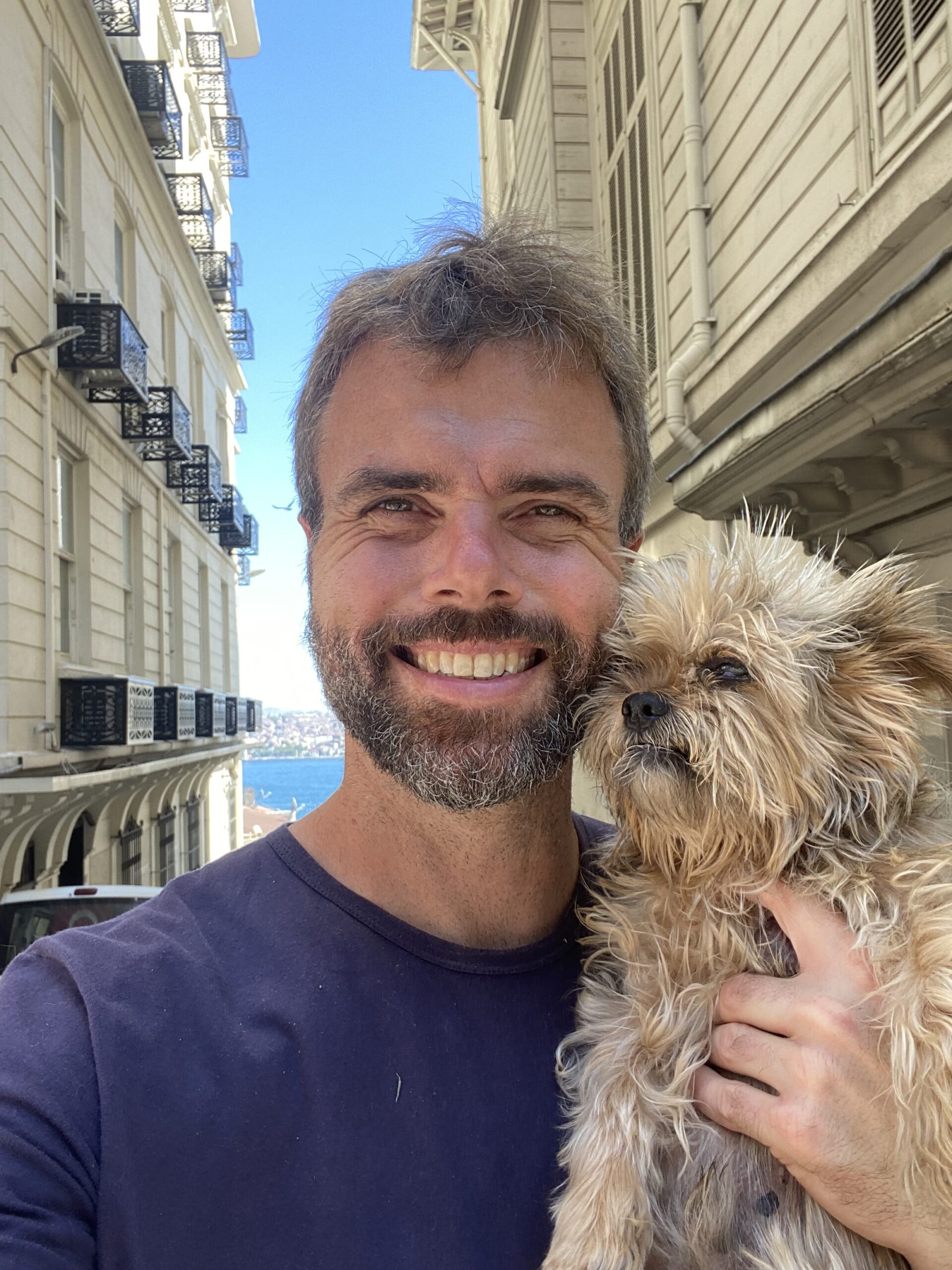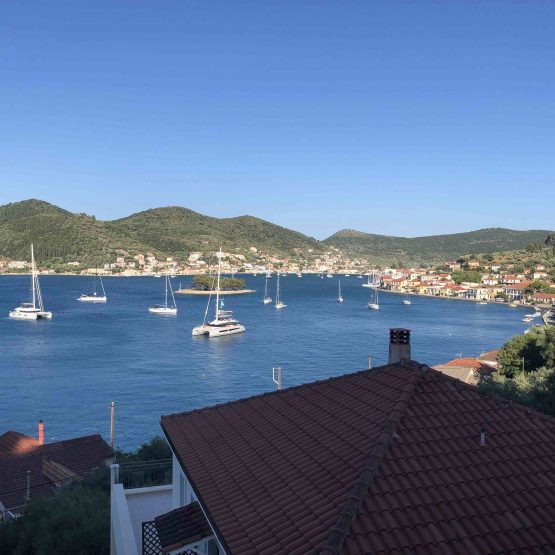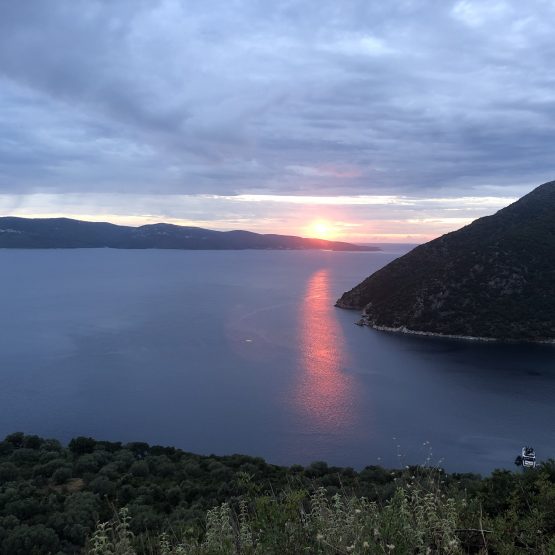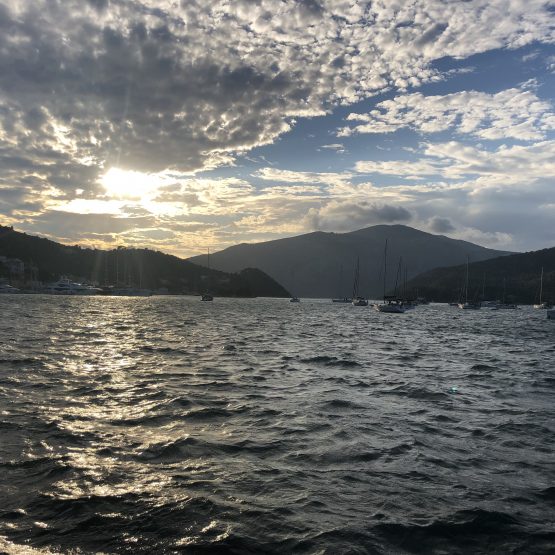As the sun set
At sunset, Tom walked down the promenade. He approached the end and came to the other balustrade divided by the stairwell that enclosed the lightly littered sward where the mother dog raised her pups. He had, knowingly, a false anticipation that the mother dog and her last pup would be there. He wanted to see the mother with the pacific eyes, her pup teething at her belly, rolling playfully down the hill, bouncing at empty water bottles, and prancing around joyously with nothing but a banana peel in its mouth. But Tom knew it was wishful thinking. He approached the balustrade, gripped his hands on the rail, and peered over into the enclosure. There was nothing. The region lay bare of life. He stared at the area for some time. The water bottle, banana peel, and the black shawl that the pup once tugged away from behind the palm tree in the corner were absent too. The sun set on Tunisia as it always does. Another day was over.
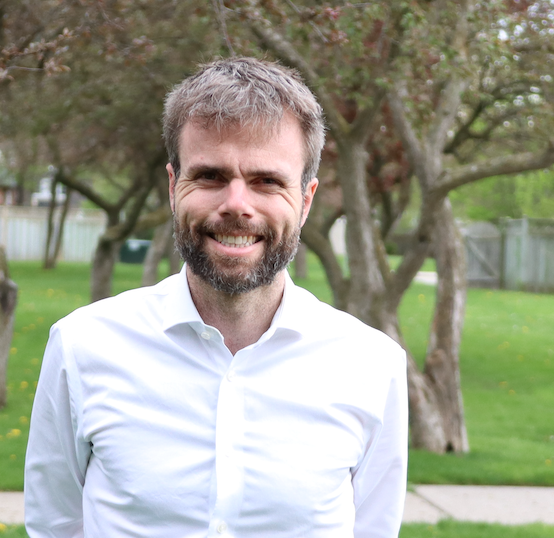
Andrew Schiestel is a Canadian publisher who explores and documents the Mediterranean Basin.
The morning of a new year in La Marsa, Tunisia
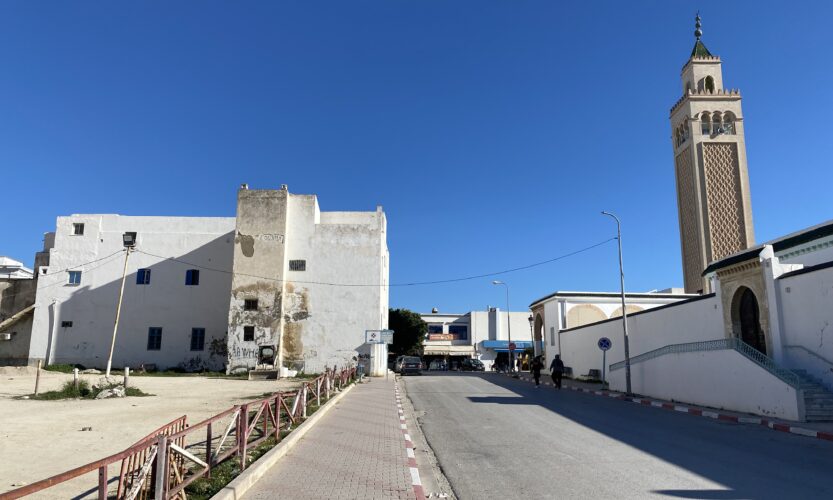

Andrew Schiestel is a Canadian publisher who explores and documents the Mediterranean Basin.
The Door Down the Hall
“Bang! Bang! Bang!”
Tom’s eyes shuttered open. It was the wee hours of the morning; Tom was lying on his back in bed. The noise was distinct: a person brazenly banging their knuckles on a neighbour’s door; which one on the floor of Tom’s condominium it was difficult to ascertain but it wasn’t the adjacent one.
This wasn’t the first time this contemptuous interruption had occurred. About a month earlier, on a Saturday night too, Tom endured hearing a neighbour’s door open and shut—likely the same one—repeatedly at odd hours throughout the night. Each episode would begin with the forceful banging on the door.
Before the pandemic, and intermittently when municipal By-Laws would permit during it, his condo would receive a desirous spectrum of short-term rental users: travellers, businesspeople, family members providing auspices to hospitalized loved ones, and those engaging in prostitution.
“Bang! Bang!”
His eyes flickered open again. There was respite between the first interval—enough for Tom to get a little more slumber but not enough to enjoy it.
He contemplated calling Concierge, but the intervals were so intermittent. “What?” He said to himself, “The Concierge would need to show up at the exact moment someone happened to be rebuking their fists on a door?” Mathematically unlikely, he concluded.
Then he heard the door open faintly in the distance. Then it shut. About a half-minute later the door opened again. And then it shut again. There was no fist banging this time, only the opening and the closing of the door.
Tom’s curiosity got the best of him—He got out of bed and dressed himself. “Am I going to walk in on a pimp, a couple ruffians, something else?” He pondered to himself.
He put his moccasins on.
Ever so quietly he opened his door.
Even more quietly he closed his door behind him, being sure to do so with the handle dropped to the bottom as far as it would go so as not to trigger the latch-clipping sound.
The format of the residence-level floors in the high-rise building were all but a complete square if it weren’t for one fraction utilized for the building’s stairwell. The units were situated along the perimeter of the building; the hallway existing one stratum into the structure.
Tom turned the first corner.
He heard the door shut again; the noise palpably louder as he came nearer.
He walked down the next corridor. He heard the door in question open. The sound gaining prominence. He was getting closer. His heart started to beat faster. He was also coming to the floor’s receptacle shoot. He thought rapidly, “Should I be holding a garbage bag? What exactly am I going to do when I see what I’m going to see?” He continued walking.
The door opened again. He came to the next corner. He heard the door close. He rounded the corner.
He stood still. There was nothing. Or no one for that matter. The hallway was bare.
Tom just stood there, inconspicuously silent. The silence went on and Tom continued to stand there in solitary. He heard nothing. The night became toweringly quiet, and time slowed. He stood there, his senses reaching full acuity.
The door made a clicking sound, the door’s handle lowered, and the door creaked open—Tom’s heart began galloping.
Out came a cadaverous looking elderly woman dressed in a full-length white slumber gown. She turned towards Tom, looked directly at him, but kept turning until she faced the door to which she exited from. The door shut behind her. She stood looking at the door. Tom stood speechless, and shocked, at the moment, not breaking his stare. She reached her right hand out, gripped the handle, turned it down, opened the door, and walked back into the unit. The door shut behind her.
Tom didn’t realize this, but his mouth was agape. He stood—his body stiff and his mind fixated on what was happening. “Did she even see him?” He wondered.
The door’s latch made a clicking sound again. The door handle lowered slowly, and the door opened. Out came the cadaverous looking woman again; she turned towards Tom again, but didn’t stop, and completed another turn to face the door. The door closed behind her. She reached her right hand out, gripped the door handle, lowered it, pushed and opened the door again, and re-entered the unit. The door shut behind her again.
That was the last time she would exit her unit that night with Tom standing there. But it wasn’t the last time that he would hear someone brazenly knocking on that door, and it opening, and closing, in the wee hours of the morning.
The woman was a sleepwalker.

Andrew Schiestel is a Canadian publisher who explores and documents the Mediterranean Basin.
British Conversations in the Spanish Mountains
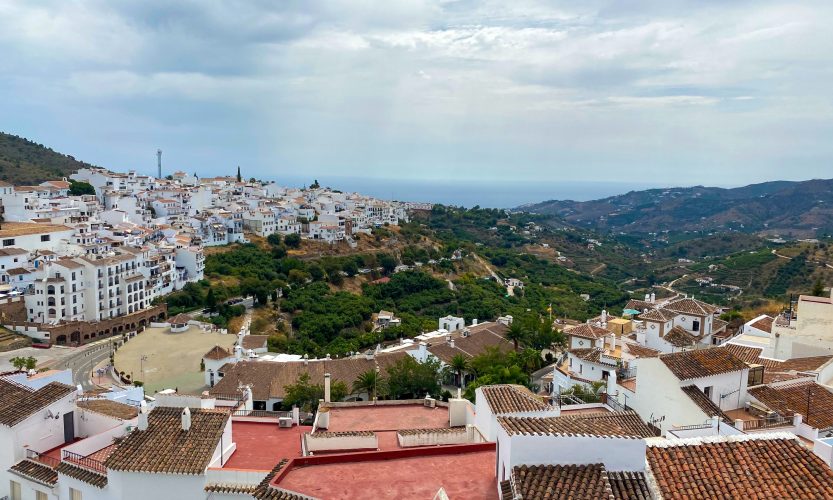
Frigiliana is a little gem of a village located in the mountains in the Costa del Sol, a 15-minute drive north of Nerja, and 45 minutes east of Málaga.
I sat at a café’s patio run by a British woman for 19 years who was reticent at first but gradually opened up.
“How did you get to running a café here?”
“I was raised in Madrid. My father was in film.”
A British couple sat down.
“We’re worried about Brexit,” They explained to me as we conversed. “It split the country. Half are for it; half are against it. It was a lot about immigration.”
The convivial couple was most worried that the U.K. parting from the E.U. would introduce the 90 of 180 rule: That’s rule that citizens of Canada and the United States and certain other countries are under—that is, you may stay no more than 90 days in a 180-day period in the Schengen Area.
The retired couple lives in a quaint coastal city near Almería about an hour’s drive away.
“We decided to do the lock down [COVID-19 travel sanctions] in England.” They said. They returned to Spain in July.
As the pair left, another British couple arrived.
“We live up there,” The wife pointed to the mountains.
“When we visited the place and saw the view, I wanted it,” The wife became effulgent. “I didn’t even care what the home looked like!”
“You can change a home; you can’t change a view.” I said. We all chuckled.
A short while later, a heavy set and bald garrulous British man sat down and began drinking red wine alone waiting for a guest to arrive.
“I sold my business in the U.K. and the plan was to travel the world. I’ve always wanted to see Australia.”
“I was in the courier business for 30 years.” He continued.
“The deliveries around the city were bread and butter,” He said. “Is that a term you’re familiar with—bread and butter?”
He emphasized to me that most of the money in the courier business is made on international shipments.
His plan was to travel to Australia, New Zealand, Canada and the United States. He would meander with no real plans.
He rented an abode in Frigiliana and was waiting to see how COVID-19 would pan out. He liked the region but didn’t want to stay long-term.
“Which of the 42 restaurants do I want to eat and drink too much at today?” He dryly quipped.
When asked if he’d ever do logistics consulting, he was adamant against the thought.
“I’m done with the business!” He emphasized. “I enjoyed it at one point but I’m sick of it now.”
In addition to being known for fantastic views of the horizon, traditionally architected buildings, and colourful puertas (doorways), every year in August, Frigiliana hosts a festival called 3 Cultures where people celebrate Muslims, Christians and Jewish people living harmoniously in society together.
The hero image is of Frigiliana, Andalusia, Spain in the mountains in the Costa del Sol; the sea in the background.

Andrew Schiestel is a Canadian publisher who explores and documents the Mediterranean Basin.
A Morning in Yorkville
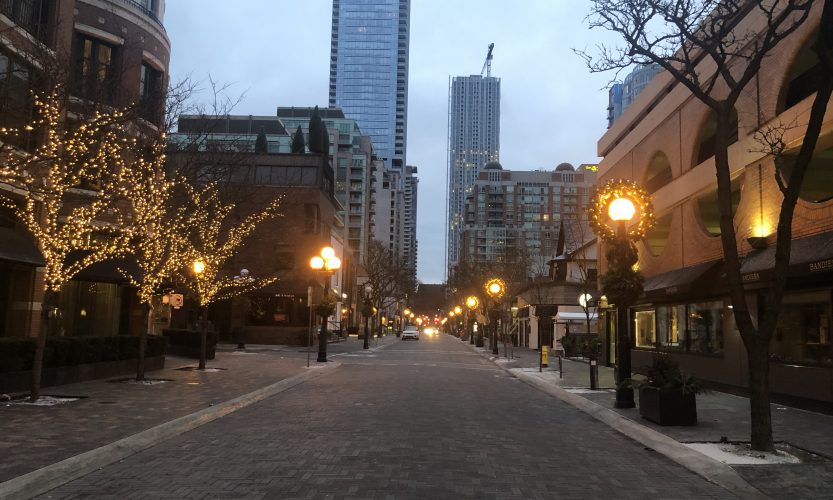
Tom’s feet landed on the white shower towel on the carpet next to the bed laid by a handmaiden the night before. Along with an evening ritual performed by housekeeping staff came the offerings of an Italian bottle of sparkling water, a spray bottle of bed mist, a plate of assorted fruit and Swiss milk chocolate. Before slumber, Tom skipped the bed mist but ate the chocolate.
He sat at the bedside with straightened arms leaning on the duvet coming to his senses. He stretched and began pressing buttons affixed to the wall that the headboard stood perpendicularly against. Fumbling with options, one button ushered the drapes open on the adjacent wall in the capacious room at The Hazleton Hotel. If it wasn’t for the nascent thralls of a Canadian-winter, natural light would have porously illuminated the chamber; another button turned on the lights.
His feet, one and then the other, stepped onto to the washroom’s floor. The marble tiles warmed each foot from heel to toes, the floor’s heating system still cozy from the night before. In the glass pane shower he picked up the hotel’s cleansing products arranged on the carved-out cubby situated four feet above the ground. With appreciation, he returned the offerings, bent down and picked up the bottle of Korres that he had brought with him, a shampoo and body soap he discovered showering in a home along the pier in the Village of Vathy on the Island of Ithaca. Since the discovery, all the way from one of Greece’s most fulcrum mythical islands, a dear friend would mail and keep Tom replete with bottles of the Natural Aloe and Dittany and the Citrus types – his favourites from the flock.
The scents of the soap enveloping his body each morning, would without fail, port him imaginatively back to the island. Like an enthralled lover experiencing simulacrum throughout the day, the soaps’ lucid scents reminded him vivaciously of Ithaca. He knew his work on the island wasn’t done and yearned for his return.
Yorkville, known for its affluent shopping, prodigal condominiums and exquisite dining is a fairly two-by-four block district located in downtown Toronto. This morning Tom was there to relax, experience the surroundings and write.
Tom buttoned a freshly steamed blue-collared dress shirt, pulled up blue jeans, buckled a black leather belt, tied up blue running shoes, tossed on a blue baseball cap and put on a black Moose Knuckles jacket. He kept the dress shirt tucked out.
The elevator made its way from the third floor to the ground. Entering the hallway with towering ceilings, Tom made it a point to inhale the eucalyptus oil scent permeating the corridor and started following the black rectangular mats from the batch of elevators through the lobby into the vestibule and greeted two formally dressed concierge staff manning the entrance doors: their duties to perpetually open the doors and salute guests coming and going all day.
The downtowns of many Canadian cities in December are sporadically spirited with Christmas decorations; Toronto no different. Yorkville Avenue is a quiet one-way street and this morning at sunrise there were no more than two vehicles in motion within sight.
Tom reached the district’s landmark alleyway; its vocation to connect Yorkville Avenue to its counterpart to the south—Cumberland Street. Eclipsing the alley on its western wall was a sequence of outdoor advertisements, about a dozen framed posters in total, each trying to position a brand as regal in the eyes of the trodden beholder. On the eastern side were freshly cleansed windows of a restaurant and a few contemporary boutiques selling opulent female clothing, fragrances and handbags sourced from foreign lands.
Crossing Cumberland, the desolation of vehicles comparable to Yorkville Avenue, Tom entered the agora of Yorkville, a concrete pavilion, an acre’s worth, that serves as a seating and walking area for locals and tourists alike. There was a variety of motifs planted symmetrically across the landscape: there were the evergreen trees fortified by half-round, two-foot tall, concrete pieces moating their bases; there was a monolithic hill in the centre of the pavilion comprised of superimposed stratified rock inclining to reach twelve feet in height—the hill would attract adults to loiter and children to meander on when the weather more simmer; there were dozens of kindred plastic objects resembling stars, hung with Christmas lights, burrowed into the ground.
Tom walked down a brick-paved aisle flanked by the furrowed stars, followed the walkway winding east, paced another 30 meters and entered a Starbucks at the south side of the pavilion.
The Starbucks was small. Tom couldn’t remember a tinier Starbucks—even in his travels through Europe—than this one. But given the district’s serene milieu this morning, it served his aim of reading and writing moderately. All the tables in the Starbucks—only four in total—were high-top in size. He situated in the closest one to the entrance door. Shortly after, he began reading and sipping a short Americano prepared with two long shots of espresso.
—
Tom turned his head to the right taking a break from his reading and locked eyes with a Caucasian woman approaching the Starbucks from the agora. A beautiful woman she was: possessing a clear and slender face, black hair, slightly above average in height and was wearing a parka and black pants. She liked Tom when she saw him. And not long-ago Tom would have greeted her and perhaps if he was travelling further away than Toronto, he would have this time, but Tom didn’t approach her – there was no conjoining of their destinies, and for the time being was absorbed in his craft. She met a girlfriend inside the Starbucks who was waiting for her arrival. The woman that liked Tom would talk extra loudly and laugh frequently with her friend in lobbing distance to Tom, enough that he could hear her. And though tempting, Tom still didn’t approach her and felt content with such.
Tom would continue to read and write moderately. In peace he was, somewhat in a zone, flowing and focused. He continued to sit at the table next to the front doors absorbing the surroundings and performing his craft.
After another while, in his periphery, the contours of two people approached the entrance. Tom looked up and it was a man and woman, the woman leading. Tom looked into the eyes of the woman now less than five meters away; she gazed back at him presently, peacefully and with a sense of curiosity.
The woman had fare, slightly tanned skin, was average in height, petite, and a face that was soft, natural and real. Her eyes communicated happiness, not jubilation, but certainly happiness. The depths of her eyes revealed a soul that was loving, feminine and bright. She wore a Canadian Goose parka, a scarf, black well-fitted nylon pants and running shoes.
The woman and man entered the Starbucks, the woman broke her gaze with Tom upon entrance as if her entrance was the perforation of a different microcosm. The two walked around the sparse assortment of tables, following the path to the counter and commenced ordering drinks.
Tom continued with his craft without much addenda figuring the two were a couple. Worked away Tom did on his computer, continuing to perform his craft. A moment later he overheard the two order their drinks and pay separately. The man then abruptly left the building to make a phone call from the pavilion.
“May I get your name for the cup?” The ordering server asked the woman with the bright soul.
“Maria,” replied the woman, her accent Spanish.
And like a riveting jolt Tom’s back straightened, his head perked, and his senses squared, as if millions of loose particles floating aimlessly simultaneously calcified into one object in the matter of milliseconds.
For some time, perhaps by premonition, and paradoxically, Tom saw himself marrying either a woman from Indian or Spanish descent. And he was fond of the name Maria. He once met a Portuguese/Swiss woman named Maria in the most random of ways: in a desolate bar in the wee early morning hours on a Wednesday in a small village in Switzerland. He would spend some time with Swiss Maria. His heart yearned for her but his mind did not – he knew she wouldn’t be a good wife and mother. She enjoyed cocaine too much. And Tom knew such a vice would create a number of foreseeable and unforeseeable problems. For instance, how do you tell a future daughter not to do hard drugs if Mommy did so at a similar age, he would wonder to himself. Since that trip in the Swiss Alps he has searched for a woman where his heart and mind could nod at the choice to marry. Too many people wed when their heart or mind assent; uncommon is a couple who has received the blessings of both.
Sitting in this Starbucks in Yorkville, Toronto, on a December morning, Tom wondered if fate knocked.
And if so, so what?
He chose to act.
“But this woman is with a man,” Tom said to himself, resisting the decree, hesitating, juggling the ethics of what his heart was urging him to do.
“It doesn’t matter – go and explore what’s there,” His heart retorted, committed to getting his mind on board with the act. “You owe it to yourself to act. And you perhaps even owe it to this woman with a bright soul.”
He scrambled to type down a separate thought he was in the midst of conjuring on his laptop before fate chose to arrive and fumbled saving the file on the computer; enough to call it a hesitation.
His plan was to order a drink and if fate continued to mingle, he would wait for the drink at the drink tray counter at the same time the woman would be still waiting for hers.
Finally saving the file, Tom rose from his seat and two other men entered the Starbucks and by a mere second wedged in between Maria and him in line. Tom harangued himself for fumbling or either bothering to save the file he was working on.
The man that Maria was with was still outside on his phone.
The first wedging man ordered his drink, swiped his mobile app and onward he went.
Tom thought to himself at this speed he’ll be to the drink tray counter in no time, and yes, he would greet this Maria with a bright soul.
The second wedging man ordered his drink with precise speed, swiped his mobile app, and onward he walked to the drink tray counter.
Tom began approaching the ordering counter.
“Sir,” The ordering server said to the last wedging man. “You’re short of money on your card. The transaction didn’t go through.”
Tom stepped back and the last wedging man returned to the counter.
The latter wedging man pulled out his wallet, searched for a credit card, kept the card in one hand, lifted his mobile phone with the other, pressed a button to awaken the phone juggling it in one hand and his credit card and wallet in the other, with a pinky finger entered the six-digit password into the phone, the biometrics feature clearly dormant, waited a moment for the phone to reach the main screen, located the correct mobile application icon, pressed it, waited for the application to load, waited for the application to pass through the introduction screen, visually sought around the application’s main screen for the order button, pressed it, stretched the phone outward, scanned the phone’s application barcode against the application scanner, waited ten seconds for the server to load the desired deposit via the Point of Service terminal, accepted direction from the server to insert the credit card into the Point of Service device, waited a few seconds for instructions to appear on the terminal, pressed Enter, inserted the 4-digit passcode for his credit card with an index finger, pressed Enter, pressed the screen of his phone to awaken still juggling the phone, credit card and wallet amidst two hands, swiped the phone’s application barcode again against the application scanner, received an offer from the server to acquire a receipt for the order, confirmed the offer with a “Sure,” and nod, then waited, waited, waited some more and then received a receipt from the server.
How easy physical money would have been.
Off the second wedging man went.
Tom reached the counter, ordered a Green Tea, Grande in size, one bag in, no room. His phone’s application had funds.
By this point the two wedging men who ordered simple drinks left the café; the only person standing at the drink tray counter was Maria still waiting for her order.
“Are you from Spain?” Tom asked her, walking up to the table.
Maria turned around, smiled at Tom as if she knew already him and said, “No, Columbia. How did you know I wasn’t from here?” She asked inquisitively.
“Your accent,” He smiled, mischievousness in his eyes.
She giggled, her face glowed, her eyes sparkled.
By this point the man Maria was with had returned from his phone call and had situated himself at one of the four high top tables.
Tom let things be at this point, said no more, Maria picked up her drink from the tray, gazed at Tom as she walked by, maintained a smile, and returned to sit down with the man she had entered the café with.
Tom went back to his computer, Green Tea in hand, and went back to his craft.
The two, the man and Maria, would converse, not knowing each other that well. Then suddenly the man stood up.
“I’ll be right back,” He said.
“Okay,” Maria replied.
The man walked to the washroom.
For the second time in this act Maria was alone, this time sitting at a table six feet away from Tom. The energy between the two of them palpable.
“So are you two in a relationship?”
This was the question in this heated and opaque moment that Tom should have asked.
This was the question that would have yielded the response from Maria, “No.”
And like a sequence of dominos falling that occur when simply the initial one is flicked this obvious response would naturally have yielded to another, “Would you like to grab a coffee sometime?” In which Maria’s response, creating the beautiful artistic, symmetrical experience that cascading dominos create as one descends upon another, would have been, “Yes.”
Tom would then acquire her number, go back to his craft and Maria would leave shortly after with the incumbent man to complete the outing she had promised, out of respect. Her soul was bright and with it came compassion for others. But after the outing she would wait for a time soon that she would be on an outing with Tom.
But Tom didn’t ask that first question: the first domino was never flicked. His mind won the disputation.
The moment passed. Tom could feel the moment pass, like the ending of an epoch. Moments occur. Questions asked at different times, even by mere seconds, can produce dramatically different results and sometimes dramatically change life itself.
“So are you living in Columbia?” This was the question Tom did ask as Maria sat silent in solitude.
The question was rinsed-down, a consolation at best, more to quell Tom’s anxiety of acquiescing in the previous moment.
Slight tension showed on Maria’s face to the query. She was now a Canadian and wanted people to see her as such. But she liked Tom so eased her face almost fast enough to hide her subtle annoyance to the question, warmed her face again and smiled. She paused before responding, glanced at the man who was now a couple feet from returning to the table, turned back to Tom and responded, “No, I live in Canada.”
Tom nodded, giving a smile. She smiled warmly back.
“Well, are you ready to go?” The man asked Maria, anxious at this point to escape the venue with her. “We’re going to have fun today.” He reassured her.
“Sure,” Maria responded smiling at the man.
After a few more words, the two stood up, clasped their cups, the man hurriedly left the building, Maria trailed.
Tom lifted his head from the computer as she passed. Maria was looking at him. She had been for a moment already.
“Cya,” she said.
“Take care,” Tom replied. Maria smiled, put her head down and continued the cortege out the Starbucks.
The next morning, while driving, Tom wept. It was short but a good weep. It was the mourning of a future that wasn’t to be and therefore a weep was well-earned.
“What leads to a truer life,” Tom pondered. “man-made or natural ethics?”
Maria would think of Tom many times since that day wondering who the man was wearing a blue ball cap that greeted her in the tiniest of Starbucks in the District of Yorkville in the City of Toronto in the Country of Canada, four-thousand kilometres from her provenance.
Little did Tom know, nor could he have known at the time, that the day’s happenstance was the impetus that would inexorably lead him back to the Island of Ithaca only five months later.
A nostos was nearing.
He would return home.
The hero image is of Yorkville Avenue in Yorkville, Toronto, taken the morning of January 1st, 2020.

Andrew Schiestel is a Canadian publisher who explores and documents the Mediterranean Basin.
Elysium
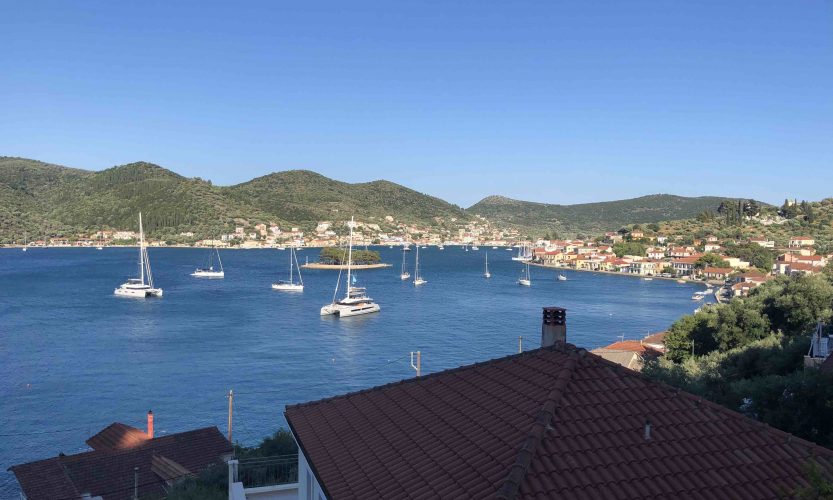
“Want me to take the picture?”
The family of three—husband, wife and daughter—were going to take each other’s photos in pairs; the plan was: first the mother and daughter, and following, the father and daughter.
Tom knew the plan because he heard the trio conversing while passing; the daughter initiated the idea as the party walked eastward along the southern part of Vathy’s bay.
The husband, in his late forties, looked at Tom for an extended moment before responding.
“Yes, thank you.” He smiled graciously.
Tom reached out and the man handed him his phone.
The three were pleasant in demeanour and clearly enjoying the day. The mother was similar in age as her spouse—wearing a light tank-top shirt, worn khaki shorts, black sandals and a modest silver-toned watch; the daughter, around 24 years of age, was a younger spitting image of the two and wore a long flowing dress with flowers imprinted and a bracelet on her right wrist; and the man wore a worn grey t-shirt, dark grey shorts, black sandals and nothing around his wrists.
Tom made sure to take several photos, both portrait and landscape in posture. He also started taking the photos early before the three put on their smiley-faces, because sometimes, you get the best photos of people that way.
“Thank you,” the husband said, accepting the phone back.
“Where are you from?” the wife asked.
“Canada.”
“Ahh, Canada.”
“You all?”
“United Kingdom.”
“Ahh, England?”
“Yes.”
“I was in London a year ago, March, Soho” Tom said. “But never left London. Except for Heathrow. How do you like this island?”
The three nodded.
“An incredible island,” The man looked over at his wife. “The two of us visited this island 25 years ago.”
“Oh wow, that’s a long time ago.” Tom chuckled.
“Yes, it was 1994,” The man recited the year on demand like it wasn’t the first time he had done so on the trip.
“Is it much different?”
“Cephalonia is much different. Ithaca not so much.”
“You mean places like Sami have developed a lot more?”
“Exactly,” The fellow said. “Although Ithaca clearly is getting some interesting tourists these days, like that yacht over there.” He turned and pointed to a prodigal yacht, 150-feet in length, parked on the western side of the bay and chuckled, a hint of sarcasm in his tone.
Tom noticed the yacht too last night when he arrived on the island. It was the largest yacht he had ever seen. It was parked south of a fleet of sailboats—a dozen from the U.K. and one from France.
“You should come for dinner sometime!” The man proclaimed with a chuckle.
“You bet,” Tom played along. “Two years ago I visited Ithaca.”
“Really?” The wife and husband both said almost simultaneously.
The daughter stood still listening intently, keeping very quiet.
“See the mountain over there?” Tom pointed north across the centre of the bay up at Mount Nirito in the distance. “When I arrived in Ithaca, I went into the souvlaki shop at the corner,” He motioned his hand along the southern part of the bay to the southwest corner. All three nodded their heads in understanding. “I asked a Greek woman standing in line, ‘Can the mountain be hiked and how long?’ She said, ‘Yes, two and a half hours up.’ So I thought to myself, ‘Two and a half hours up, two and a half hours back, throw a baguette in the knapsack, a bottle of water, maybe an orange, leave at 8, be back by 1!'”
The three laughed, following along.
“I spent five days in Vathy and was going to do the hike on the sixth and final day. It was the coldest winter Greece had seen in 16 years. The day I woke up to do the hike, it was raining outside and gosh was it cold!”
“Oh no!” The husband exclaimed; all three sinking deeper into the story.
“Yes, and when I started to make my way up the mountain there was plenty of snow! My left foot was starting to freeze as I walked. It was getting dangerous.”
The three continued listening, becoming more intent.
“Near the top of the mountain, I entered a café in the Village of Anogi. The owner of the café knew I wasn’t in good shape, grabbed my arm when I entered, pulled and sat me down on a wooden chair in front of a portable coal fireplace to warm up and laid out nuts and crackers to eat. And upon leaving when I tried to offer her money for them, she refused to accept it.”
The three continued to listen, their attention seized.
“As I was getting ready to leave she went behind a counter and lifted up a woman’s winter jacket and said, ‘Put this on,’ I said, ‘No, I’m not taking your jacket.’ She said, ‘Don’t worry, you’re going back to Vathi, right? My brother works in the coffee shop in the square. Give it to him in the morning.”
“What did you do next?” The husband asked emphatically.
“I put the woman’s winter jacket on, of course! And proceeded to walk four and a half hours back down the mountain! It was 10pm by the time I returned that night to Vathy. And when I got back into the village, I went back to that same souvlaki shop and ate a big plate of souvlaki! And when standing up thirty minutes later, I’d never felt so much pain in my thighs before!”
“Oh wow!” The daughter and mother spurted out simultaneously, all three laughing, a mixture of shock and awe.
“The two-and-a-half hour hike one way turned out to be five and a half hours one way, four and a half back. It ended up being 34 kilometres in total!”
“Wow!” The husband spurted next.
“And if I had known it was going to be 34 kilometres, you bet I wouldn’t have done it in the first place. I wasn’t in shape for it!” All three continued laughing at the thought of it all.
“So where do you live in England?” Tom asked.
“A place called Thornbury, a beautiful country. It’s in the southwest, about 40 minutes from Bristol and the ocean.”
“Sounds beautiful.”
“Aye mate, it really is,” The husband said.
“Well, have a wonderful rest of your trip all,” Tom said. “What a pleasure this has been.” Tom placed his right hand, open, in front of his heart.
The family of three smiled warmly and said their goodbyes to Tom.
“See you in another 25 years,” the husband quipped jovially as Tom walked away.
Tom chuckled.
The family walked back to their 150-foot yacht named Elysium.
The hero image is of the Village of Vathy on the Island of Ithaca, Greece, taken from the northwestern shore. Many sailboats anchored; the centre islet is that of Lazereto, which hosted the island’s jail until the 1950s, and today a chapel.
Elysium is available for purchase as artwork at Ithacabound.com.

Andrew Schiestel is a Canadian publisher who explores and documents the Mediterranean Basin.
The Elephant And The Turtle
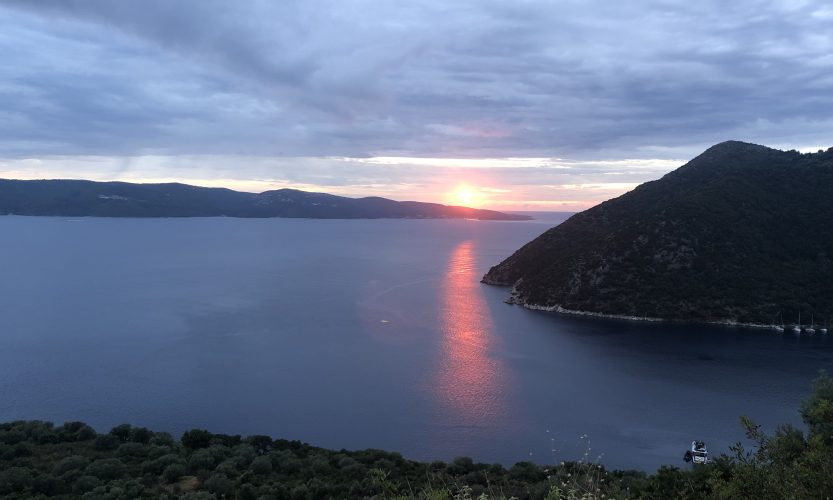
And there was the Port of Aetos.
The ferry docked by way of a cleat hitch around a horn cleat helped by a worker at the port.
Tom disembarked the ferry and set his feet on the Island of Ithaca; he had returned.
Port Aetos was deserted if it weren’t for the travellers, the vehicles waiting for the travellers, the ferry itself, a pop-stand operated by an old woman, and a few construction workers laying cement in a twenty-by-thirty rectangular perimeter that lay on the wharf.
Tom accessed a map software on his phone to check the distance he was to walk. He was staying in Vathy tonight and chose not to risk imposition by asking his host for a ride from the port.
Seven kilometres, the software read.
Tom snapped shut the waist and upper belts of his rucksack, inverted the tinier knapsack around his chest—four straps covering his shoulders in total—and began the trek up the hill towards Vathy, leaving the port.
Halfway up the tall, winding road, he turned back to the port and took a few photos of the ferry departing. The vessel was on its voyage back to Patras to complete another summer’s day of work when a red Datsun sedan pulled up with its windows down. It was being driven by a middle-aged woman—tanned with brown, slightly curly long hair—leaning partly out the driver’s side window.
“Want a ride?”
“I’m going to Vathy,” Tom said. “That alright?”
“I’m going to the north. Can drop you off halfway.” Her English was clear.
Tom unbuckled the straps of his sacks, opened one of the Datsun’s back doors, tossed the sacks onto the backseat and hopped in the vehicle.
“Where you from?” Tom asked.
“Australia.”
“Why are you here?”
“My family is from the northern island.”
“There’s another island in the north?”
“No, same island. But the northern part.”
“Ahh. Greek background?”
“Aye. In the fifties there was an earthquake on the island; a devastating one. Many people lost their homes. The countries of South Africa and Australia were welcoming to those effected. Thousands migrated and many of the families return here in the summer months. Ithaca will always be home.”
The car was up over the hill, winding, bend along bend.
The two made small talk and it wasn’t long until the vehicle entered a cove, a mountain in the distance, and a fork in the road. “Here’s your stop. You go right, I go left.”
“Ahh, thank you for your generosity.” Tom hopped out of the car, opened the backdoor and grabbed his two sacks laying on the seat. As the door slowly began to shut, the Australian-Greek turned to Tom abruptly and hastily stretched her right arm out, palm-up—she was holding two small tawny objects.
“You dropped these,” she said.
“Oh, the elephant and the turtle!” Tom exclaimed with relief. “A man with a kind soul from Senegal came up to me in Athens. His cousin makes them; the material is from the ocean. The Senegalese man said that they bring very good luck to those who hold them.” She gave them back to Tom with indifference, smiled, Tom shut the door, and she drove away.
Good luck was on her way and she didn’t even know it.
The red Datsun drove west and then north around the cove, up the southwestern side of Mount Nirito in a zigzagged pattern through the centre of the isthmus and disappeared into the north.
Tom walked the rest of the way to Vathy.
The hero image is of the sun setting on the Ionian Sea on July 16, 2019. To the left, the Island of Cephalonia; to the right and below, the Island of Ithaca.
The Elephant and The Turtle is available for purchase as artwork at Ithacabound.com.

Andrew Schiestel is a Canadian publisher who explores and documents the Mediterranean Basin.
